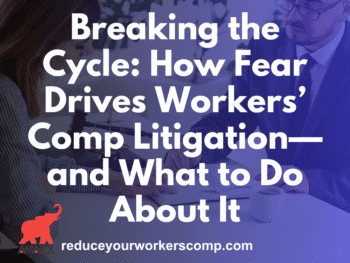How Would You Decide:
Here’s what Tom Robinson, J.D., writer for Lexis Nexis Workers Comp Law Center reports.
Vermont High Court: Supervisors May Be Personally Liable for Discriminatory Actions Directed Against Worker Who Exercises Rights Under Workers’ Compensation Act
Here’s What Happened
Payne sued her former employer, US Airways, her supervisor, and several co-workers for, among other things, sexual harassment and discrimination under the Vermont Fair Employment Practices Act (VFEPA) and discrimination for filing a workers’ compensation claim under the state’s Workers’ Compensation Act (WCA). Among her allegations, Payne contended that following a work-related injury, her supervisor failed to investigate the claim, required her to take sick leave for work days missed, interfered with her medical treatment, inappropriately criticized her, took supervisory duties away from her, and eventually participated in the decision to fire her. After US Airways filed for bankruptcy, she settled with her former employer in order that she could proceed with her claims against the individual defendants. She subsequently dropped her former co-workers as defendants, leaving her former supervisor as the sole remaining defendant. The trial court granted the supervisor’s motion for summary judgment, holding that neither the VFEPA nor the WCA provided a right of action against a co-employee or supervisor in his or her individual capacity. Payne appealed.
Here’s How the Court Ruled In Payne v. US Airways, Inc., 2009 VT 90, 2009 Vt. LEXIS 114 (Sept. 25, 2009), the Supreme Court of Vermont reversed agreed, holding that under both the VFEPA and the WCA, Payne enjoyed a personal cause of action against her supervisor. Noting that the VFEPA defined “employer” so as to include “any agent,” the court indicated supervisors could be personally liable under that act’s provisions. Under the WCA, the court observed that “[n]o person shall discharge or discriminate against an employee … because such employee asserted a claim for benefits” [21 V.S.A. § 710(b)]. The court added that in as much as the WCA did not define “person,” the court was obliged to interpret the term consistently with the rules set out in Title 1, Ch. 3 (V.S.A. § 101), which defined “person” as including “any natural person.” The legislature’s decision to use the term “person,” rather than “employer” marked a clear departure from its approach to employer-only liability in the rest of the WCA. The court said that “[r]ather than ignore this distinction and assume the Legislature meant what it did not say, we will interpret the statute according to its plain meaning.” Furthermore, said the court, the legislative choice to expose co-employees to discrimination liability was consistent with preventing workplace cultures that discourage employees from obtaining compensation to which they were entitled. Finally, the court acknowledged that the supervisor cited case law from Texas, Illinois, and Kansas in support of construing Vermont’s WCA to exclude employees from personal liability for violating the antidiscrimination policies, but the court found the cases to be “inapposite or unpersuasive.” (workersxzcompxzkit)
See generally Larson’s Workers’ Compensation Law, § 104.07.
Tom Robinson, J.D. is the primary upkeep writer for Larson’s Workers’ Compensation Law (LexisNexis) and Larson’s Workers’ Compensation, Desk Edition (LexisNexis). He is a contributing writer for California Compensation Cases (LexisNexis) and Benefits Review Board – Longshore Reporter(LexisNexis), and is a contributing author to New York Workers’ Compensation Handbook(LexisNexis). Robinson is an authority in the area of workers’ compensation and we are happy to have him as a Guest Contributor to Workers’ Comp Kit Blog. Tom can be reached at: compwriter@gmail.com.
http://law.lexisnexis.com/practiceareas/Workers-Compensation
WC IQ Test: http://www.workerscompkit.com/intro/
WCBooks: http://www.reduceyourworkerscomp.com/workers-comp-books-manuals.php
Follow Us On Twitter: www.twitter.com/WorkersCompKit
A NEW Article: Return to Work in Unionized Companies
Do not use this information without independent verification. All state laws vary. You should consult with your insurance broker or agent about workman’s comp issues.
If you would like permission to reprint this material, contact Info@WorkersCompKit.comHere’s How the Court Ruled



























